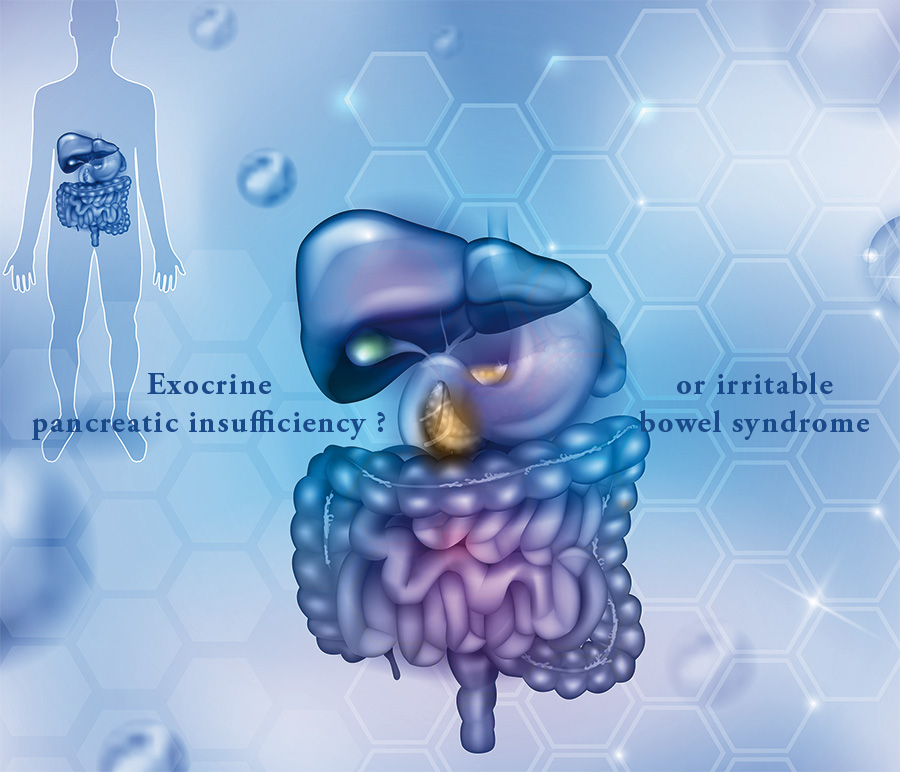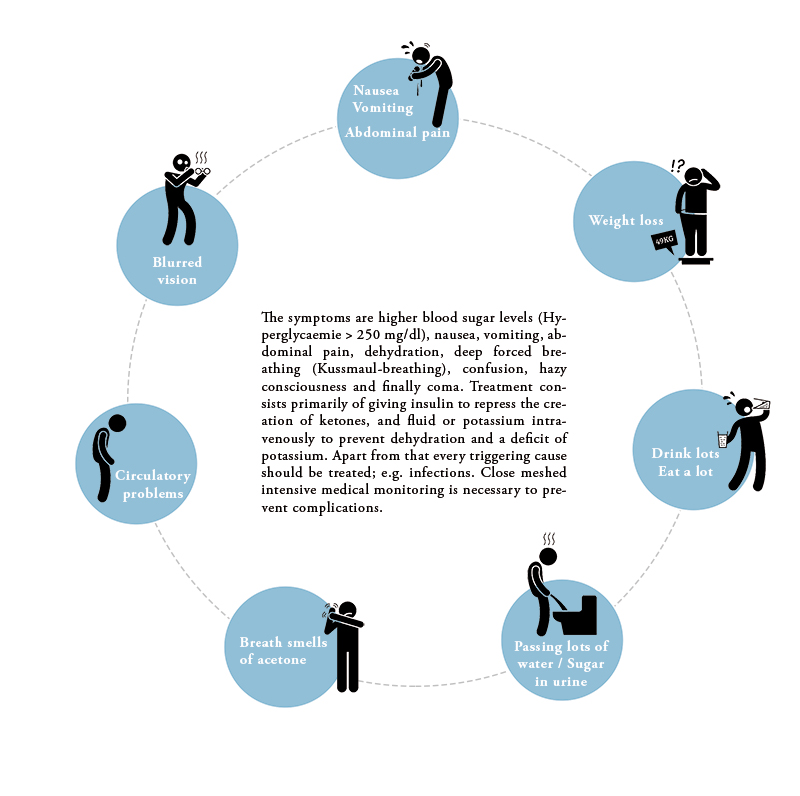Exocrine pancreatic insufficiency or irritable bowel syndrome?
For years I have been committed to assisting people affected by pancreatic diseases, especially pancreatic cancer; by advising, caring for and accompanying them. They report on their own experiences, achievements and disappointments; for example, if the examination results do not allow a clear diagnosis after repeated emergency admissions to the clinic - and in the end the diagnosis may be "irritable bowel syndrome". Anyone who deals more intensively with diseases of the pancreas will inevitably encounter this topic sooner or later.
For example, the symptoms of irritable bowel syndrome are very similar to those of acute or chronic pancreatitis. In both cases, those affected suffer frequently and massively from flatulence, abdominal pain, colic, diarrhoea and weight loss. One has to ask the question: what are the differences that can provide information for the correct diagnosis?
In addition to pancreatitis and irritable bowel syndrome, other possible causes of such gastrointestinal symptoms can be identified by differential diagnosis. Due to the complexity and individual characteristics, this can sometimes be a long process. We are often confronted with questions from those affected, some of whom have had a real doctor's odyssey behind them and still suffer from recurrent, painful diarrhoea and flatulence despite the variety of therapies they receive. The term irritable bowel syndrome is often used in this context. However, since such gastrointestinal symptoms can also be caused by completely different factors, we would like to address the question of what the frequent causes are and what those affected can do. This much in advance: It is absolutely necessary to consult a doctor in case of persistent recurring diarrhoea.
What are the causes of recurrent diarrhoea? When does one speak of irritable bowel syndrome (IBS)?
There are many causes of chronic diarrhoea lasting many weeks: from chronic intestinal diseases, side effects of medication, organic causes to food intolerances. This makes a quick and reliable diagnosis difficult. This also includes irritable bowel syndrome.
According to the guidelines of the German Society for Digestive and Metabolic Diseases (DGVS) IBS is defined as an intestinal complaint lasting longer than three months, with irregularities or changes in the bowel movement, and the quality of life of those affected must be severely restricted.
Typical symptoms can be: pain, flatulence, stool irregularities, diarrhoea and/or constipation.
In recent years, IBS has experienced a veritable "diagnosis boom" with an incidence of 6 to 25 percent of the population; women are affected more frequently than men.
IBS belongs to the group of functional gastrointestinal disorders, the causes of which are still not clearly understood. It is therefore difficult to diagnose this.
Psychological influences such as stress, anxiety and nervousness, but also disturbances of the intestinal nervous system, which are accompanied by increased intestinal movements, can play a role. In addition, a development after bacterial or viral inflammations of the intestinal mucosa is under discussion, whereby disturbances of the intestinal barrier function ("leaky gut") can also be decisive for the development of IBS.
If the symptom "diarrhoea" is in the foreground, one speaks of the diarrhoea-dominant type, with constipation of the constipation type. Many symptoms of IBS are similar to those of pancreatic insufficiency (exocrine pancreatic insufficiency, EPI), in which not enough digestive enzymes can be produced. The resulting undigested food thus causes intestinal discomfort, diarrhoea and pain. It is therefore essential that EPI be distinguished from IBS by a physician.
EPI or irritable bowel syndrome? Fat in the stool makes the difference.
Irritable bowel syndrome is an exclusion diagnosis, i.e. diseases that cause similar symptoms must be excluded by the doctor.
If a detailed anamnesis (medical history) as well as the physical examination speaks for an IBS, a basic diagnosis with routine laboratory and ultrasound of the abdominal cavity is necessary. If the doctor can rule out other possible causes such as pathogenic germs, food intolerance, bile acid loss syndrome or leaky gut syndrome, the diagnosis of IBS becomes more and more probable.
If the smell, appearance and condition of the stool differ from "normal" diarrhoea, fat in the stool must be clarified as a possible cause of diarrhoea. This is because in exocrine pancreatic insufficiency disorders, the leading symptom is also recurrent diarrhoea.
Typical EPI diarrhoea, also known as fatty stool or steatorrhea, is where dietary fats are excreted undigested due to a lack of digestive enzymes (lipase) in the pancreas. Therefore, diarrhoea is light, greasy and smelly and is difficult to flush down. Answers to questions such as "Does the stool stick? Does it shine? Does it smell very rotten? Can drops of grease be seen in the lavatory water?
If the answer to some of these questions is "Yes", this is not yet proof of the presence of an EPI, but an important indication of an EPI-related fatty stool.
You should then discuss your observations with your doctor. As a rule, EPI is diagnosed by stool analysis based on reduced pancreatic elastase 1, a marker of pancreatic function. According to the definition, an EPI is present if laboratory tests (elastase test) show that the stool contains less than 200 µg pancreatic elastase 1 per gram of stool. Values between 100 and 200 µg / g represent a light to moderate EPI, below 100 µg / g a severe one. However, some physicians point out that these guideline values may vary from person to person and consider an EPI even for values above 200 µg/g. The amount of fat excreted (> 7 g/24 hours) also indicates an EPI-induced fat stool. In addition, weight loss in those affected may indicate an EPI, but only in severe forms. Last but not least, risk factors for an EPI - such as diabetes, alcoholism and smoking - can be a further indication that diarrhoea is not caused by irritable bowel syndrome but by an EPI.
Treatment of exocrine pancreatic insufficiency: enzyme replacement
With an EPI, doctors recommend a combination of a light whole diet (no low-fat diet) to provide the body with sufficient nutrients, vitamins and trace elements and to cover the energy requirement in conjunction with enzyme replacement therapy (standard therapy). Digestive enzymes are vital: If the body produces too little or no digestive enzymes by itself, they must be supplied from the outside. The aim of taking them is to improve the symptoms, gain weight and reduce the excretion of fat in the stool.
There are digestive enzyme substitutes from pig pancreas (pancreatin) and rice mushrooms (rizoenzymes).
The decision as to which preparation to take should be discussed with your doctor. Both have their significance and are prescribed and reimbursed by the health insurance funds if necessary. A sufficient and correct intake is decisive for the success of the treatment. It is important to know that pancreatin and rizoenzymes are dosed differently. The respective patient information provides information.
What to do in case of irritable bowel diagnosis?
There is no universal treatment approach for irritable bowel patients. Depending on the trigger and symptoms, individual therapies must be carried out for each person affected.For example, dietary measures, relaxation techniques, antidepressants and psychotherapy are frequently recommended, as well as medicinal and herbal treatment options.
The diarrhoea-dominant type often uses moisture-binding dietary fibres, mobility inhibitors to reduce intestinal activity, probiotics with positive properties for the intestinal flora and phytotherapy medicinal plants such as peppermint, psyllium, bloodroot, blueberry mother juice and combinations of various medicinal plants such as myrrh, coffee charcoal and chamomile.
All treatment options must be discussed with the attending physician.
Katharina Stang






